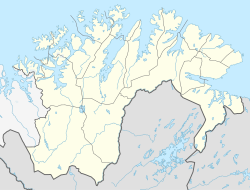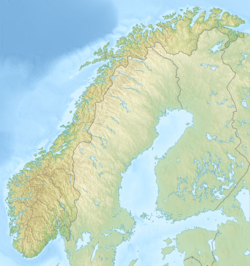| UNESCO World Heritage Site | |
|---|---|
 | |
| Location | Alta, Finnmark, Northern Norway, Norway |
| Criteria | Cultural: (iii) |
| Reference | 352 |
| Inscription | 1985 (9th Session) |
| Area | 53.59 ha (132.4 acres) |
| Coordinates | 69°56′49″N 23°11′16″E / 69.94694°N 23.18778°E |

The Rock art of Alta (Helleristningene i Alta) are located in and around Alta Municipality in Finnmark county in northern Norway. Since the first carvings were discovered in 1973, more than 6,000 carvings have been found on several sites around Alta. The largest locality, at Jiepmaluokta about five kilometers (3.1 mi) from Alta, contains thousands of individual carvings and has been turned into an open-air museum. The site, along with the sites Storsteines, Kåfjord, Amtmannsnes, and Transfarelv, was placed on the UNESCO list of World Heritage Sites on 3 December 1985. It is Norway's only prehistoric World Heritage Site.[1]
The carvings were divided into five separate groups by Professor Knut Helskog, of the Department of Cultural Sciences at the University of Tromsø. Using shoreline dating, the earliest carvings were dated to around 4200 BC; the most recent carvings were dated to around 500 BC. In 2010, researcher Jan Magne Gjerde pushed the dates for the oldest phases back by 1,000 years. The wide variety of imagery shows a culture of hunter-gatherers that was able to control herds of reindeer, was adept at boat building and fishing, and practiced shamanistic rituals involving bear worship and other venerated animals.
In April 2014, the World Heritage Rock Art Centre - Alta museum launched the website altarockart.no, a digital archive containing pictures of the rock art of Alta. The archive contains several thousand pictures and tracings and will, in the future, probably contain other kinds of documenting material as well, such as 3D-scans and articles.
- ^ "Rock Art of Alta". UNESCO World Heritage Centre.

